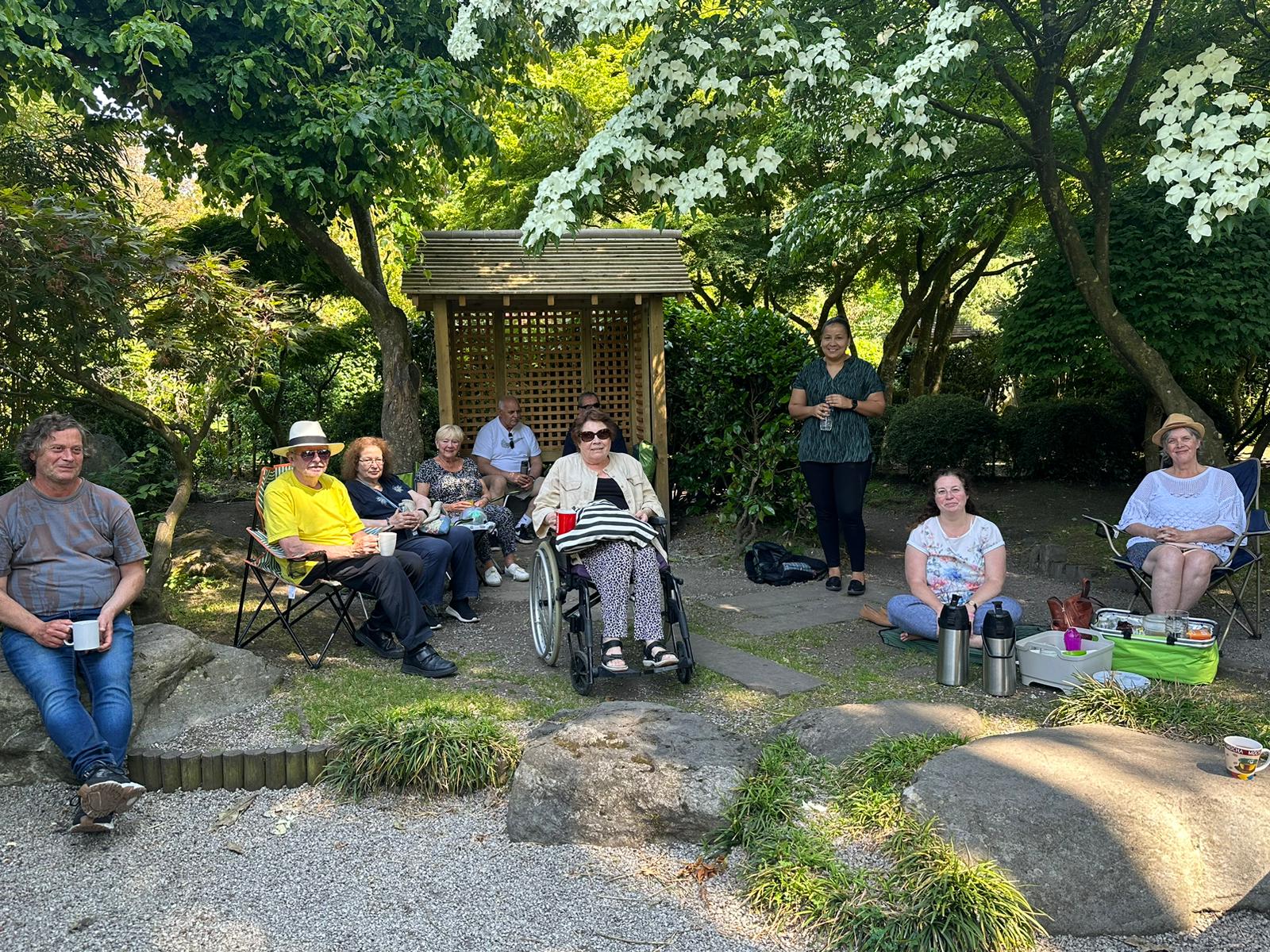Forest Bathing; bring a bit of nature therapy into your garden

Queen’s Nurse Heather Henry, owner and founder of BreathChamps CIC tells us about forest bathing and gives us some useful tips on getting started in our own green spaces.
Garden owners and visitors already recognise that nature can improve their wellbeing. But are there additional ways that can help people to not only feel better, but also to improve mental and physical health conditions, whilst visiting gardens?
Over the past 2 years I have been offering a form of Japanese nature therapy called Shinrin-yoku in my hometown of Trafford in Greater Manchester. In my role as an independent community nurse, I encourage people, particularly those with long terms mental and physical conditions, to come together to spend mindful time in nature. I recruit and train volunteers to guide these activities, which now take place in 5 locations across Trafford, as part of my organisation BreathChamps CIC, a small community group that helps people to breathe better and have fun.
What is ‘forest bathing’?
At its simplest, forest bathing is about slowing down and using all your senses to connect to nature. Being mindful by living in the present moment and noticing your surroundings is a core part of ecotherapy. Noticing improves wellbeing more than simply visiting nature (Richardson, 2021) and as guides, we use the word ‘notice’ repeatedly. Sometimes we find that groups just want to socialise when they enter a green space, especially if they have experienced loneliness. When this happens, we gently start inviting people to notice what is in front of them such as ‘have you noticed that this bee has fallen asleep in a crocus flower?’ or ‘feel the bark on this tree – how aged and warm to the touch it is?’
History
Shinrin-yoku, literally translated as immersion or bathing in nature, has been practised in Japan since the early 1980s. A national health programme for forest bathing was started by the Japanese Ministry of Agriculture, Forestry, and Fisheries in 1982. Influenced the teachings from the Shinto and Buddhist religions, it was based on an intuitive idea that people could be healed by nature.
Two thirds of Japan is forest, but the overpopulated urban life in Japanese cities is stressful; filled with techno-culture, and a phenomenon called karoshi meaning ‘death from overwork’. Today, there are over 60 official Shinrin-yoku trails in national forests and it is ‘prescribed’ by the Japanese health service, much as GPs in the UK ask their link workers to ‘socially prescribe’ nature activities here in the UK, rather than give out pills.
A doctor and researcher called Qing Li and his team at Nippon Medical School in Tokyo are credited with the earliest research into the benefits of forest bathing, which started in 2004 and is summarised in his 2012 book ‘Forest Medicine’.
Why start forest bathing?
Here are some good reasons:
- it’s a simple and free activity -– just get into nature and see, feel, listen to, smell and (if you know what you are doing) taste it!
- it brings people together – ‘we come for the camaraderie’ is the top feedback that we get when people come forest bathing with us
- it improves wellbeing and helps with quite a few heath conditions
- it encourages people to move more – especially those with mobility issues. BreathChamps attracts vulnerable people that are so keen to do a forest bath that they turn up in the rain!
- It increases community cohesion by bringing people and communities together
- it addresses loneliness and social isolation – our participants say that it is ‘something to look forward to’
- it encourages people to discover natural spaces and places together
- it helps people, especially women, to regain confidence to go outside and be in public places
- it makes us, the guides, feel happy that we are doing something worthwhile and it improves our own wellbeing and health too.
The short answer to this question is that everybody can benefit from spending more time in nature. This means that garden owners and visitors can benefit equally.
A systematic review (Wen et al, 2019) found that forest bathing can:
- reduce blood pressure
- lower stress
- improve cardiovascular and metabolic health
- lower blood sugar levels
- improve concentration on memory
- lift depression
- improve pain thresholds
- improve energy
- boost the immune system by increasing the body’s natural killer cells
- increase anti-cancer protein production
- help with weight loss.
A further systematic review however (Kotera et al, 2020) found the potential for research bias:
- randomised control trials (RCTs) focus on comparing activities in nature to those in urban environments, which are likely to be more stressful
- there are no RCTs comparing forest bathing to other therapeutic approaches such as cognitive behavioural therapy.
In summary, the research evidence so far suggests that forest bathing has intuitive and biological benefits but also that further research is needed to discover just how much, and in comparison to what.
How do you start?
If you plan to visit a garden, here is very simple way to start. If you are a garden owner, you could just print out and share the information below:
How does it work?
There are plenty of research papers looking at the various aspects the effect of nature on health; for example:
- Oxygen and chemicals called phytoncides, released by trees, improve immunity and help with a range of conditions
- The soil contains friendly bacteria called Mycobacterium vaccae that may protect against stress, reduce inflammation and improve immunity
- Shades of green and blue and the sound of running water also produce the most relaxation.
- Observing patterns in nature, such as the petals on a flower, called ‘fractals’ can lower levels of the stress
- Sunlight gives us vitamin D, wards off seasonal depression and helps regulate our body clock
- Fungi in the tree roots lock up carbon
Try it for size
The benefits of forest bathing kick in after just 20 minutes of being in a green space. If you own a garden, then don’t forget to put down your trowel and spend some uninterrupted minutes just being mindful with a cuppa. And even if you can’t get to an NGS garden, just looking out at nature through a window, or being in your own garden, will give you benefit.
Want to know more about forest bathing?
Head over to www.breathchamps.com for more info and a downloadable guide to setting up forest bathing in your own community.
By Heather Henry, Queen’s Nurse
Owner and Founder, BreathChamps CIC




















